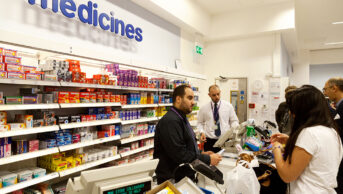
Shutterstock.com
Estimated NHS spending on medicines has grown from £13bn in 2010/2011 to £17.4bn in 2016/2017, an average growth of around 5% annually, a report from The King’s Fund has revealed.
According to the report, ‘The rising cost of medicines to the NHS – what’s the story?’, published on 26 April 2018, medicines spending has increased at a substantially faster rate than for the entire NHS budget during the same period, which grew by about 1% annually.
Costs grew most in the hospital sector, the report shows, at around 12% a year on average since 2010/2011, meaning that hospitals now account for nearly half of total NHS spending on medicines.
In primary care, spending growth was much slower at 0.6% each year, and although the volume of prescription items provided to patients in primary care increased by almost half (46.8%) between 2006 and 2016, reductions in the average cost per prescription item of almost a quarter to £8.34 limited spending growth.
The report also found that, in England, policy makers are having to grapple with how to weigh up priorities of giving patients fast access to effective treatments, while incentivising the pharmaceutical sector to develop new products and ensuring expenditure on medicines is affordable for the NHS.
It said that there are still opportunities for the NHS to reduce medicine spending through the use of cheaper generic drugs and increasing the uptake of biosimilars. But the King’s Fund has expressed concerns that, if something is not done soon, these funding pressures may lead to widespread concerns about patients’ access to medicines.

Source: MAG / The Pharmaceutical Journal
Sandra Gidley, chair of the RPS English Pharmacy Board, says that the NHS shouldn’t be using a “slash and burn approach to budgets” and it should ensure that the right medicines are used in the most appropriate way
“As medicines are the most frequent intervention in the health service it is understandable that medicines spend is compared year on year, however, it is fatuous to blindly try and cut medicines budgets without taking into account the wider implications of cutting medication,” commented Sandra Gidley, chair of the Royal Pharmaceutical Society’s English Pharmacy Board.
“The argument needs to be wider so that we are truly comparing the overall costs to the health service of prescribing and deprescribing — for example, a well-managed diabetic has a greatly reduced chance of further complications and their consequent costs.
“We don’t need a slash and burn approach to budgets, we need a reasoned debate about how to ensure that the right medicines are used and in an appropriate manner and we need to work out how to best use the unique skills of pharmacists in order to achieve this,” she added.
You may also be interested in

Tackling the NHS drug budget: why we set up a regional collaboration for medicines value

Lack of joined-up working between pharmacy and general practice is ‘nonsensical’, says former BMA chair
